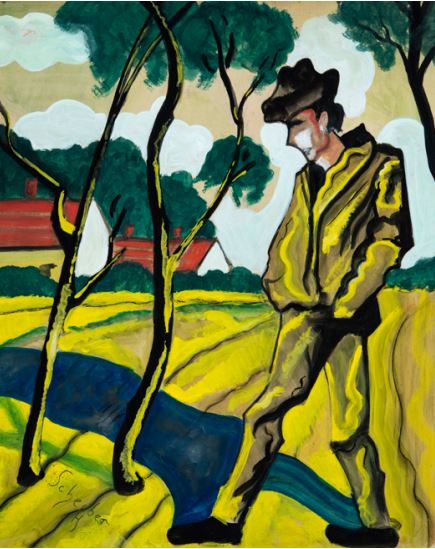Description
Hugó Scheiber, a Hungarian painter who emerged in the first half of the twentieth century, is known for his unique style that fuses elements of futurism, expressionism and Art Deco. His work "Vandor" is a persuasive manifestation of this stylistic amalgam, transposing a vibrant and restless world on the canvas.
When observing "vandor", a dynamic composition is immediately perceived, characterized by energetic lines and bold chromatism. The painting seems to capture a fleeting moment, arrested in the midst of the movement. Scheiber uses a contrasting color palette, where blue, violet and brown are intertwined in a harmonious chaos, suggesting both the materiality of the figures and the atmosphere that surrounds them. This color use not only provides emotional intensity, but also creates a rich visual texture.
In the center of the work, the lonely figure of the vandor (which in Hungarian means "traveler" or "vagabond") occupies a prominent place. The character, probably a reflection of the restless and wandering spirit of Scheiber, is represented with an unstable posture, almost crossed by the force of the diagonal lines that symbolize movement and transition. His face, outlined with acute features and a thoughtful expression, evokes a sense of introspection and introspective search.
The Scheiber technique highlights its ability to summarize the human form in an almost abstract visual language. Geometric figures and soft curves amalgam to form the traveler's silhouette, at the same time that they suggest their connection with the environment. This stylistic approach is characteristic of the influence that avant -garde European trends of the time had in Scheiber. The influence of futurism is palpable in the representation of movement and mechanical energy, while expressionism is manifested in emotional burden and deliberate distortion of reality to transmit a deeper vision.
Scheiber, who formed in the Budapest of the early twentieth century, was deeply immersed in the artistic effervescence of his time, interacting with key figures of European modernism. "Vandor" not only reflects his technical ability, but also his commitment to explore and express the complex realities of human existence: uprooting, the search for identity, and confrontation with modernity.
In the context of Scheiber's work, "Vandor" is placed as a significant piece that allows us to contemplate its artistic evolution. Compositionally, remember other works where it explores similar issues of urbanity and loneliness, but with an intensity that seems singular. The presence of symbols and the game with geometric shapes are a testimony of their versatility and their ability to adopt and adapt various styles in their own visual language.
In summary, "Vandor" by Hugó Scheiber invites us to a meditation on the trip and movement, both exterior and interior. Painting is a testimony of the author's artistic depth and its ability to merge various currents of thought in a cohesive and powerful work. Scheiber offers us a frozen moment in time, but loaded with energy and meaning, reaffirming its place in the avant -garde of modern art.
KUADROS ©, a famous paint on your wall.
Hand-made oil painting reproductions, with the quality of professional artists and the distinctive seal of KUADROS ©.
Art reproduction service with satisfaction guarantee. If you are not completely satisfied with the replica of your painting, we refund your money 100%.

